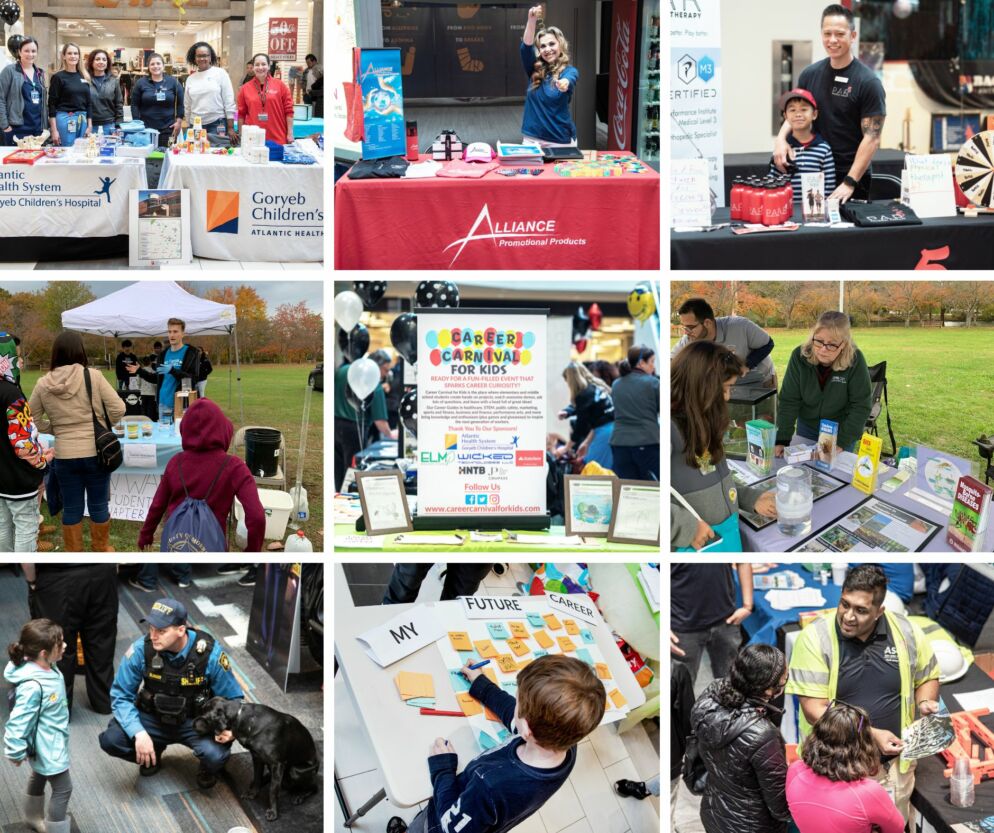
introduced about 350 students to an array of jobs across such industries as
automotive, aviation, culinary, engineering, health and wellness, law enforcement, military and more.— Career Carnival for Kids (Courtesy of Career Carnivals)
For many children participating in Take Your Child to Work Day (TYCTWD) on Thursday, April 25, the experience will be enlightening, exciting and, quite possibly, brand-new. However, the genesis of this special career exploration day goes back over 30 years to a time when women had far fewer opportunities in the workplace.
Looking to bolster young girls’ self-esteem and encourage them to consider possible future careers, the Ms. Foundation for Women conceived of Take Our Daughters to Work Day in 1993. At the time, the more modest—but still ambitious—plan was to run a pilot program in New York City. Once Gloria Steinem shared this innovative concept in a Parade magazine article, the idea took off across the nation, and that plan quickly changed.
The initiative became “one of the most successful national public education campaigns ever launched,” according to the Ms. Foundation’s website, which also notes that the program “became known to 8 out of 10 people across the U.S., and now involves 35 million participants each year.”
The evolution of a national initiative
The introduction of Take Our Daughters to Work was something of a revolution, followed by a lengthy evolution as the program adapted to an expanding participant base and faced funding, staffing and other challenges.
One particularly significant change: in 2003, the program’s name officially became Take Our Daughters and Sons to Work, representing a more inclusive stance and acknowledging the value the experience could offer boys as well as girls.
Another was the Ms. Foundation’s decision in 2007 to spin off the program as a separate nonprofit entity, the Take Our Daughters and Sons to Work Foundation, under the leadership of Carolyn McKecuen.
The recipient of numerous awards, including the prestigious MacArthur “Genius Grant,” McKecuen was a trailblazer in cause-driven marketing and training who put her considerable talent and experience into furthering the mission of TYCTWD until her death in 2022.
Now led by interim Executive Director Dave Oliveria, the foundation continues to set an annual theme for the day—this year, it’s “Inspire 2 Aspire”—and serve as a resource to the many companies, schools, government organizations and others who plan their own formal and informal programs.
Partnering for continued success
Despite the enthusiasm so many kids, families and employers maintain for the initiative, donations to the Take Our Daughters and Sons to Work Foundation had dwindled over the years, a troubling trend that accelerated during the pandemic. Left with a volunteer-only staff and a limited budget, in 2023, the foundation found an outstanding partner in Junior Achievement USA, a national nonprofit that focuses on work readiness, entrepreneurship and financial literacy for young people.
Oliveria credits Junior Achievement with “picking up the slack” with last year’s
video and other offerings and notes that “Junior Achievement has a lot more resources, as well as relationships with many schools, creating the potential to expand to more opportunities throughout the year.”
According to Ed Grocholski, Junior Achievement’s chief marketing officer, “Many kids don’t have an understanding of the world of work, so there’s a genuine interest and need.” His organization is looking to “find ways to reinvigorate the effort,” and with a presence in all 50 states and existing career exploration programs, including an extensive job shadowing program, Junior Achievement appears uniquely positioned to do exactly that.
In addition to updating the curriculum and promoting the initiative, Grocholski shared that Junior Achievement is “focused on expanding beyond daughters and sons to a broader population, especially kids who don’t normally have that opportunity to participate.”
Education, inspiration and fun for everyone
Employers large and small, from law enforcement to law firms and from manufacturing sites to medical facilities, celebrate TYCTWD. Many look to the Take Our Daughters and Sons to Work Foundation for the annual theme, tips and toolkit, while others chart their own course. Some are very structured; others not at all. Some involve parents throughout the day; others do not.
In short, there’s no one “right way” to introduce kids to the world of work, but there are lots of excellent practices in place across the country:
Make the experience interactive. Cole Schotz, a New Jersey -based law firm, holds a Mock Trial related to its TYCTWD theme, with all of the kids playing different roles.
Offer meaningful learning opportunities. Central Arizona Project sets up multiple rotations so kids can learn about different functions at the company, such as Safety, Engineering, Environmental, Wellness and more.
Give older kids a “job.” In St. Petersburg, Florida, both the Fire Rescue and Police Department have older teens help with the younger kids as group leaders. Assigning this next level of responsibility not only allows the program to run more smoothly but also aligns with the skills and qualities of first responders.
Promote good works. Volunteerism is central to the company culture for many employers. Yazaki North America, in Canton, Michigan, incorporates a charitable project, such as cards for the military or blessing bags for the homeless, into its comprehensive TYCTWD schedule.
Create lasting memories for kids and adults. Among its many TYCTWD offerings for employees and tenants of its Minneapolis, Minnesota, buildings, Transwestern Real Estate brings costumes for “career dress-up” and has a photo booth to capture those fun and educational moments.
TYCTWD alternatives and add-ons
While TYCTWD supporters are quick to relate meaningful memories from years past and impressive plans for 2024, there are also employers that either stopped hosting these annual events or never started. Some workplaces aren’t “kid-friendly,” often for safety reasons, and others simply aren’t welcoming for other reasons.
Resistance isn’t always on the employer side either, especially since the official TYCTWD date is the third Thursday of April—a school day and, in some cases, a scheduled standardized testing date. Central Arizona Project is one company that eliminated the issue by shifting its program to June.
If TYCTWD isn’t an option for your family, or if you are looking for structured career exploration opportunities beyond TYCTWD, there’s no shortage of possibilities, many of which are free and open to all. Schools and libraries often hold career-focused events, while organizations like Junior Achievement, 4H, Girl Scouts, Scouts BSA and others offer a variety of programs for different grade levels.

What’s in a name?
The official switch in 2003 from “Daughters” to “Daughters and Sons” reflected a philosophical shift as well as a practical one. Increasingly, we hear “Kids” or “Children” or even “Students” instead of “Daughters and Sons”—so much so that we used the term “Take Your Child to Work Day” for this article.
For many, a catch-all term may just be easier, but for others, it’s a more significant choice. That is, companies may welcome grandchildren, nephews and nieces, neighbors and others. And in line with Junior Achievement’s goal to make the experience even more inclusive, we may see more kids with no direct connection to a company participate in these programs going forward.
And while the different names for the initiative—Take/Bring Your/Our Daughters and Sons/Kid/Child to Work—largely reflect the same core concepts, we recognize that it can be a challenge to navigate, especially in our hashtag-driven world.
Michelle Hollander, a graduate of Yale College and Yale School of Management, co-founded Career Carnival for Kids, LLC to spark career curiosity among elementary and middle school students. Sharon Hollander, a licensed psychologist and graduate of Pace University, writes and presents on children’s literature, art therapy, autism, therapeutic horseback and more.







